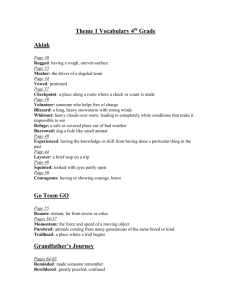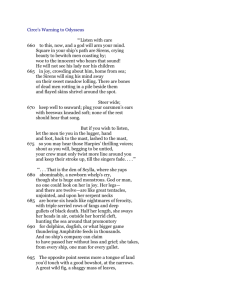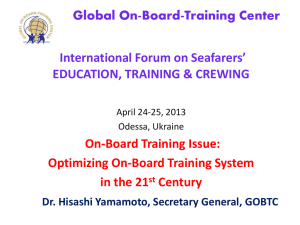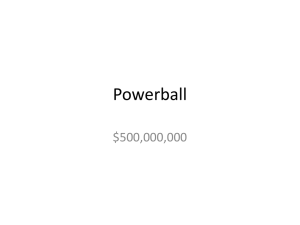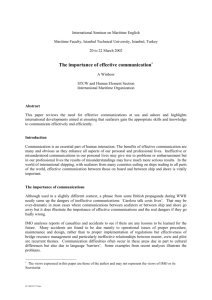www.wallem.com Delivering Maritime Solutions
advertisement
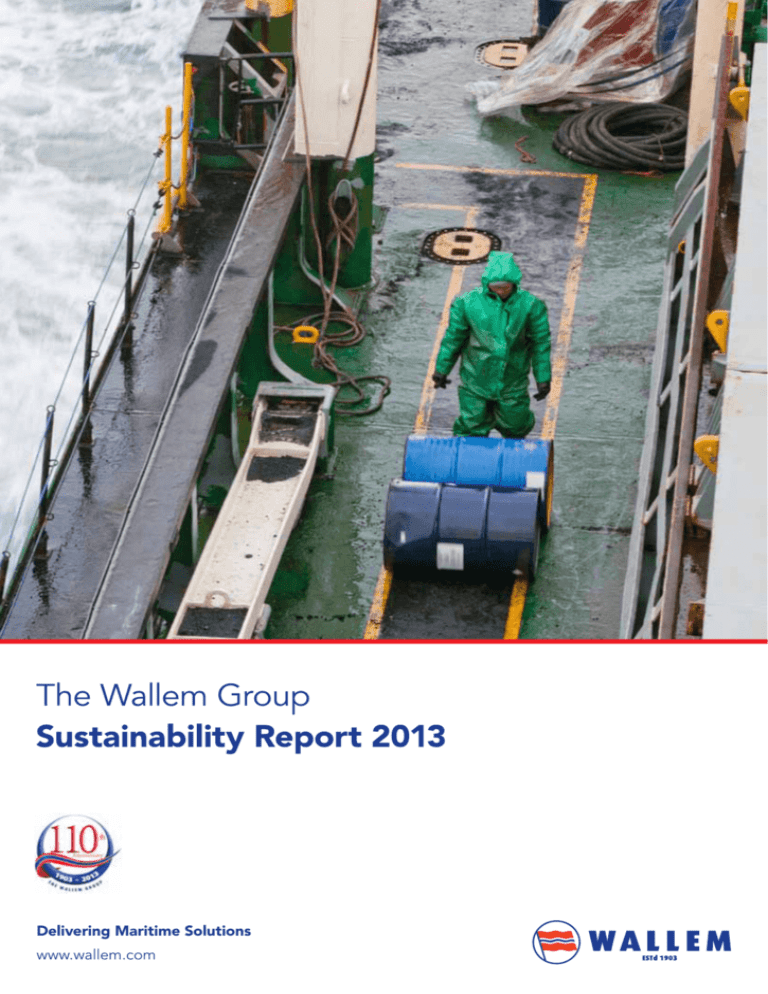
Delivering Maritime Solutions www.wallem.com The Wallem Group ISO standards currently held by Wallem Group companies are: • ISO 9001: 2008 – Quality management • ISO 14001: 2004 – Environmental management systems The Wallem Group delivers maritime solutions. In fact our trusted reputation for delivering services to the maritime industry has been established over 110 years. It’s a heritage we are extremely proud of. • ISO 20000: 2005 – Information technology service management Today we deliver integrated solutions from 47 offices in 18 countries, across Ship Management, Ship Agency, Ship Broking, Commercial Vessel Management, Freight and Logistics, as well as innovative BPO and IT services. It’s a diversity of solutions that meets almost every customer need in our industry today, and indeed tomorrow. We constantly search for new ways to drive the continued evolution of our business. Compliance with these standards is audited annually by Det Norske Veritas (DNV). • OHSAS 18001: 2007 – Occupational health and safety management systems Training Our people are at the core of these solutions. Their reputation for delivering quality services with the highest levels of friendly professionalism, and going the extra mile, is unsurpassed. And we constantly seek to sustain our industry leadership by creating a place where our people can develop and are respected. The first Wallem Maritime Training Centre for seafarers opened in 1994 in Mumbai, India and since then additional centres have been opened in Kolkata, Delhi, Chennai, Chandigarh, Manila, Qingdao, and Odessa. These centres offer training that enables seafarers to update their skills in areas such as navigation, engineering, bridge management, using safety equipment, and the effective use of Wallem’s own systems and processes that form the backbone of efficient and safe vessel operations. They are also provided with wider skills and knowledge to help them efficiently manage their vessels and crew. For individuals to be considered for promotion, and indeed to continue sailing with Wallem, they must successfully complete courses which are appropriate for their ranks. The result is a team of seafarers who understand and comply with the requirements of their charterers, ship owners, port authorities and all applicable international laws and regulations. In today’s global economy where shipping plays a more vital role than ever before, Wallem is dedicated to the long-term sustainability of our business and making a positive contribution to the communities we serve. We express this commitment through our work to enhance maritime safety and the competence of our crews; our efforts to minimize the environmental impact of our operations; our determination to observe the highest standards of corporate governance; our support for the overall development of the maritime industry; and our initiatives for the welfare of our seafarers and the communities from which they come. Safety and Training Wallem strives to maintain one of the industry’s best marine safety records, meeting and generally exceeding international standards. We place a strong emphasis on training as a key element in achieving this, as well as in upgrading crew competence generally, and Wallem operates EIGHT Training Centres for this purpose. International Standards Minimum standards for the international shipping industry are established by the International Maritime Organization (IMO) and the International Organization for Standardization (ISO). To provide our staff with a safe place to work and our customers with a high quality service, Wallem aims to meet and where possible exceed the standards set by these organizations. Wallem’s Safety, Health, Environment and Quality (SHEQ) policy meets the standards of the International Safety Management Code (ISM Code), which is the international standard for the safe management and operation of ships and the prevention of marine pollution. The Wallem Group Sustainability Report 2013 www.wallem.com 2 The Wallem Group Sustainability Report 2013 www.wallem.com 3 People Courses are updated regularly and new skills training packages are provided based on feedback from ship performance measures such as LTIFs, Port State Control inspections, and near-miss root cause analysis. Onboard training is part of everyday life on board a Wallem-managed vessel. A library of computer-based courses is on all vessels and seafarers are expected to refresh their existing skills or learn some new ones. Wallem has contributed directly to some of these courses with our experienced safety department personnel providing real-life situations and solutions for Tanker Management Self Assessment (TMSA). Specialised Training Superintendents also visit ships regularly to review performance, recommend improvements, highlight industry developments as regards best practice, and in general ensure that the whole crew is competent in every aspect of safety management and emergency drills. Wallem is committed to building strong, sustainable and diverse teams. We focus on the health and welfare of our people and their families, through programmes aimed at educating employees to make informed choices about their health, creating an environment where employees can create balances around their work and life, and having our Seafarer’s spouses join together to create cause motivated, mutually supportive communities. Wallem prizes itself on its caring, respectful family environment, where our people can see a long term future in a company that rewards performance. The Next Generation of Seafarers To improve the sustainability of supply of experienced and qualified officers, a new program in the Philippines was introduced in April 2009 called the Cadet Upgrading Program. The goal is to improve the theoretical knowledge of Filipino nautical and marine engineering graduates to an international shipping industry standard. The courses provided in the program focus on science and mathematics and a range of navigational, meteorological and marine engineering subjects. The Training Superintendents inspect the safety equipment, audit bridge procedures and ensure compliance with the ISM (International Safety Management) and ISPS (International Ship and Port Facility Security) Codes. At the end of their visit, the Training Superintendents identify beneficial value-added training courses for officers to complete on their next visit to a Wallem Maritime Training Centre. In practical terms one of the most objective measures of the safety of a ship is the Lost Time Injury Frequency (LTIF) rate. Training courses, drills, manuals, crew member attitude and safety equipment all contribute to the LTIF. If a seafarer is injured, the accident is reported and the time period when he or she is unable to work is measured. This is known as a lost time injury. The frequency of these injuries is calculated per million working hours. The result is a value which all shipping personnel strive to reduce to zero - which equates to no injuries in the work environment. After graduating, cadets serve on board a Wallem-managed ship for one year. They then sit the Philippines Professional Regulation Commission exams and, when licensed, serve as junior officers or junior engineers on Wallem’s managed fleet. The training and assimilation of Cadets into the Wallem fleet is an ongoing and important part of our efforts to create a sustainable supply of qualified officers for our vessels. At the same time the use of our Ship Mate system allows us to better manage and develop the career progression of our more experienced seafarers. Wallem measures the LTIF for the fleet of ships under our management according to the Oil Companies International Marine Forum (OCIMF) Marine Injury Reporting Guidelines. Training is without doubt an important factor in reducing the LTIF. With the implementation of MLC 2006 there is now greater emphasis on crew welfare and training, and in this regard Wallem already meets and usually exceeds the required standards. The Wallem Group Sustainability Report 2013 www.wallem.com 4 The Wallem Group Sustainability Report 2013 www.wallem.com 5 Wallem and the Environment Marine Pollution – Zero Tolerance The shipping industry’s role in reducing its effects on the environment is growing, and Wallem is always conscious of the environmental impact of our operations. We work to avoid marine pollution and reduce our environmental footprint, and to help our customers to do the same by bringing important issues and solutions to their attention – both to reduce costs and to limit any adverse environmental impact. We support our customers in making their ships cleaner and safer with strong technical support and continuous improvement in crew knowledge. MARPOL 73/78 is one of the most important international marine environmental conventions. It was designed to minimize pollution of the seas and includes laws on the dumping of waste, oil pollution and exhaust pollution. Its stated objective is “to preserve the marine environment through the complete elimination of pollution by oil and other harmful substances and the minimization of accidental discharge of such substances”. Green Award The MARPOL Convention applies to all types of pollution – from operational and accidental causes. It includes prevention of pollution from oil, noxious liquids, harmful substances, sewage and garbage. The “Green Award” certifies that ships are extra clean and extra safe, and Wallem Ship Management is the only Hong Kong-based company which has achieved this coveted Green Award certification. The goal of this program is to make high standards in safety and environmental care more economically attractive to ship owners and operators. Thus, ships with a Green Award are given reduced fees when visiting ports in Belgium, Canada, Latvia, Lithuania, The Netherlands, Oman, New Zealand, Portugal and South Africa. The certification scheme is operated by the independent non-profit Green Award Foundation and is open to oil tankers and dry bulk carriers of 20,000 dwt and larger. A Green Award, which is valid for three years, is granted after successful completion of an office audit, and an audit of each ship applying for certification. The audit includes crew, managerial, environmental and operational elements. Wallem applies a zero tolerance policy towards pollution of any kind and any seafarer on board a Wallem-managed ship found knowingly breaching the maritime pollution regulations will be removed from the ship and action taken with the flag state and national authorities to revoke his or her licenses. Therefore Wallem always ensures that before boarding a vessel to commence work, a Wallem seafarer is briefed on his or her obligations under the MARPOL Convention and Wallem’s zero tolerance policy. The crew member then signs an Environmental Protection Undertaking to show commitment to MARPOL, and that they are fully aware of Wallem’s Safety, Health, Environmental and Quality Policy (SHEQ). The SHEQ is a commitment by all Wallem staff, whether on board or working in an office, to adhere to the local, national and international regulations applying to health, safety and the environment. The SHEQ also aims to minimize the risk of MARPOL violations aboard ships. For example, the measures include banning of all plastic bags and colour coding all waste bins for rubbish separation and easy recycling. Unique identification tags are also attached to all seals on pipes of the oily water separation system to prevent the system from being tampered with. MARPOL also covers specific measures to reduce air emissions from ships, limiting the sulphur oxide (SOx) emissions in many countries to just 0.1% by 2015 but certainly limiting such emissions globally to only 3.5% by 2012. To adhere to these important changes in reducing air emissions, a plan has been developed for every one of Wallem’s managed ships to use separate tanks for high and low sulphur fuel. The plans also ensure no ships attract financial penalties for non-compliance with the new requirements. Lastly, many cargoes such as crude oil and chemicals emit gases when inside a ship’s cargo tank which can become dangerous, forming volatile organic compounds. These gases can be a combination of sulphur dioxide, benzene and other carcinogenic elements. To carefully manage these gases in the interests of the crew and the environment, MARPOL Convention Annex VI includes a requirement for every ship to follow a Volatile Organic Compounds Management Plan. Wallem has developed such a plan for all tankers in the fleet, with each plan being unique to a particular ship to take account of her design and age. The Wallem Group Sustainability Report 2013 www.wallem.com 6 The Wallem Group Sustainability Report 2013 www.wallem.com 7 Corporate Governance Sarbanes-Oxley and SAS 70 Code of Conduct The Wallem Group’s core business is in an industry which is highly regulated. Our reputation depends on our continued integrity and on maintaining the highest standards of corporate governance. We are committed to meeting our regulatory and corporate governance obligations to maintain a sustainable company in the interests of our staff, clients and shareholders. Wallem Ship Management annually renews our SAS 70 Certification which is a requirement for all companies wanting to provide services to publicly listed American companies. The US Federal Government’s SarbanesOxley Act 2002 requires listed companies to only work with service companies that hold a SAS 70 Certificate. The Certificate is proof the service company has had its controls and operations verified by an independent third party, and meets with the highest exacting standards of corporate governance. Wallem’s code of conduct is entitled “What We Stand For (our Code)”. The document states the conduct expected from all our employees. The Code covers our commitment to clients; honesty and fair dealing; avoidance of conflicts of interest, discrimination and harassment, and insider trading; protection of company information; protection of personal data; protection of property; and compliance with laws, rules and regulations. In order to do this effectively we must manage risk, be transparent in customer cost control, and have an appropriate corporate governance framework linked to sound business practices. Management Controls Audit and Financial Management Wallem has an integrated management structure which includes a clear framework for corporate governance. Controls include, inter alia: The Wallem Audit Committee was established by the Wallem Group Board to build on the Group’s corporate governance structure. The Audit Committee, made up of two non-executive directors, convenes every six months and meets annually with the Group’s external auditor and Group Compliance Manager. Their function is to: • Weekly Management Committee meetings • Quarterly Board meetings • Quarterly divisional management meetings • Quarterly budget forecasting and revision • Bi-annual Audit Committee meetings • Annual budget meetings • Three-year plans with regular follow-up Management of the Wallem Group is further guided by the Terms of Reference for the Wallem Group Committee of the Board, Management Committee, Group Managing Directors and divisional directors. In this context “division” refers to our four core businesses, being Ship Management and Technical Services, Ship Agency and Logistics, Commercial Services and Ship Broking, and Wallem Innovative Solutions. Our Group Compliance Manager is responsible for monitoring and auditing our management controls and working practises throughout the company. Wallem Ship Management first achieved SAS 70 certification in 2008, and was the first shipping services company in the world to do so. The certification applies to fleet management, information technology and procurement processes and controls. Transparent Transactions • Monitor the integrity of the Wallem Group’s financial information; • Review the Group’s internal financial control and risk management systems, and evaluate the effectiveness of internal compliance processes; and • Monitor and review the external auditors’ independence, objectivity and effectiveness and make recommendations to the Wallem Group Board in relation to the affairs of the external auditor. Risk Management The Group Risk Committee is made up of 13 operational managers and directors and is formed to identify risks associated with their areas of responsibility and to implement and carry out appropriate measures to address those risks. The risk assessment results are reported to the Group Audit Committee for evaluation and follow-up action by the appropriate divisions. Wallem provides sophisticated procurement services to both ship management clients and third parties. The procurement process operates through a transparent and trusted portal that provides clients with a 24/7 window on all transactions. This availability of information through our online procurement system is used by ships’ captains for orders, the purchasers in Wallem’s procurement department, by suppliers and by our customers’ finance divisions. Even the quotation process can be viewed by our customers, with a comparison table for the multiple quotes collected and details of which executive approved each purchase. Anti-Bribery Policy Wallem’s Anti-Bribery Policy reflects the company’s expectation that employees demonstrate the highest ethical standards in conducting business. It sets out the required behaviour of each employee in respect of their personal conduct within their working environment. Bribery is illegal and unacceptable in our organization. Whistleblower Policy Wallem has a Whistleblower Policy to protect individuals who report inappropriate activities in the workplace. Wallem is committed to providing and maintaining a working environment which encourages high standards of ethical behaviour and integrity. Wallem encourages employees to disclose incidents of suspected misconduct or any breach or suspected breach of laws or regulations that may adversely affect Wallem. Whilst the system provides transparency and efficiencies, the technical suitability of each product is still determined by the technical superintendent responsible for the maintenance of the ship, or by a more senior technical manager when required. Quality management is further maintained by the officers who receive the goods on board, who complete a report on the standard and suitability of the deliveries. This is a mandatory step in the procurement process to ensure items are ‘fit for purpose’ and meet quality standards. The Wallem Group Sustainability Report 2013 www.wallem.com 8 The Wallem Group Sustainability Report 2013 www.wallem.com 9 Supporting the Maritime Industry Wallem in the Community The Wallem Group is an active industry partner, with individual Wallem staff members regularly participating in shipping associations and other related organizations to contribute their knowledge and experience to the development of the industry in their region. Many of these groups will lobby governments to further the interests of the shipping industry. In this way Wallem has the opportunity to contribute to discussions and decisions which will affect our company and our customers. Wallem works hard to support our staff communities, in particular those of our seafarers through our Women of Wallem (WoW) initiative. WoW is a support group for seafarers’ families, originally established in 2004 in India, but now extending to nine chapters in the main communities from which we draw crew members: India (Mumbai, Kolkata, Chennai and Delhi), the Philippines (Manila, Cebu, Davao and Iloilo) and Sri Lanka. Voluntarily organised by the spouses of Wallem’s seafarers, WoW chapters provide their members with courses in financial and family health as well as an important social support network. The families of our seafarers benefit from networking with others in similar situations and supporting each other as an extended family. Our staff represent Wallem, and the interests of our customers, in the following organizations: • Hong Kong Ship Owners’ Association The WoW chapters also choose local philanthropic causes to support through donations and fund-raising. The WoW members are well placed to understand the needs of their local communities, and can mobilise assistance quickly to provide help to those in hardship situations. • BIMCO (Baltic and International Maritime Council) • Intertanko • Intercargo Links with home are an important relief as seafaring continues to be one of the most isolating jobs in the world. This is slowly changing with improved connections through email, text messages and telephone services. All Wallem seafarers receive an account with Wallem Crew Connect which provides them with an email address and text message service to keep in regular contact with friends and family. New initiatives are now underway to extend this to full Internet access for all crew whilst aboard ship. • Lloyd’s Register Technical Committee • American Bureau of Shipping (ABS) China Committee • Germanischer Lloyd Asia Committee • Class NK Technical Committee • Working Group for the Interim Berthing Arrangements for the Advisory Committee on Cruise Industry established by the Hong Kong Tourism Commission Other initiatives include our support for the Sailors Society, which in 2013 involves an all-women Wallem team climbing Mount Kinabulu to raise funds for the Society. • Project Management Institute Head Office has also instigated a bi-annual ‘Health and Wellness Week’ for all staff, and this will be rolled out across the Group in due course. • FOSMA – Foreign Owners Representatives and Ship Managers Association (India) • Japan Foreign Shipping Association • Tokyo International Propeller Club • Bangkok Shipowners and Agents Association (BSAA) • Asian Cruise Association • Baltic Exchange • Institute of Chartered Shipbrokers • Chartered Institute of Logistics and Transport The Wallem Group Sustainability Report 2013 www.wallem.com 10 The Wallem Group Sustainability Report 2013 www.wallem.com 11 Headquarters (Hong Kong) T +852 2876 8888 E group@wallem.com Ship Management & technical services T +852 2876 8200 E wsmhk@wallem.com Ship Agencies & logistics T +852 2876 8500 E wshk@wallem.com Commercial Services & Ship Broking T +852 2876 8800 E wcshk@wallem.com Innovative Solutions T +852 2876 8050 E wishk@wallem.com Delivering Maritime Solutions www.wallem.com
